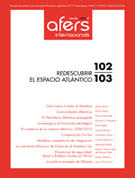La energía en el Atlántico y el horizonte estratégico
Palabras clave:
cuenca atlántica, Hemisferio Atlántico, energía, comercio, inversión, seguridad humana, gobernanza, globalizaciónResumen
Revista CIDOB d’Afers Internacionals, nº 102-103
Cuatrimestral (septiembre 2013)
ISSN:1133-6595 | E-ISSN:2013-035X
La cuenca atlántica está resurgiendo como un subsistema importante dentro de la economía política global: corrientes interrelacionadas de personas y energía, dinero y armas, bienes y servicios, tecnología y terrorismo, drogas y delincuencia; mayor acceso recíproco a los mercados, recursos y talento.
Pero las crecientes interdependencias generan nuevas vulnerabilidades y retos: cooperación en recursos y conexiones energéticas; promoción del comercio y la inversión; migración e integración; construcción de sociedades resistentes; mejora de la buena gobernanza; inversión en desarrollo humano; y lucha contra las organizaciones criminales transnacionales y sus crecientes vínculos con terroristas e insurgentes. Aunque los mecanismos de gobierno y cooperación diplomática panatlánticos todavía están en sus inicios, una serie de hechos sugieren que es posible una cooperación hemisférica amplia y entrelazada. De hecho, la cuenca atlántica puede emerger como un laboratorio mundial para una gobernanza interregional e interconectada entre países desarrollados y países emergentes.
Citas
Alcaro, Riccardo y Alessandri, Emiliano. «A Deeper and Wider Atlantic». DOCUMENTI IAI, nº. 1301 (febrero de 2013). Istituto Affari Internazionali.
Alessandri, Emiliano et al. China and India: New Actors in the Southern Atlantic. Washington: German Marshall Fund, 2012.
BP, British Petroleum. «Statistical Review of Energy», 2012 (en línea): http://www.bp.com/content/dam/bp/pdf/Statistical-Review-2012/statistical_review_of_world_energy_2012.pdf
Cunningham, Nick. «Is Russia’s grip on European energy weakening?». E!Sharp, (noviembre 2012) (en línea): http://esharp.eu/big-debates/external-action/85-is-russia-s-grip-on-europeanenergy-weakening/
Comisión Europea. Directorate-General for Energy. «Key Figures». Market Observatory for Energy (junio de 2011).
EIA. «Medium-Term Oil Market Report», 2012a (en línea): http://www.iea.org/publications/freepublications/publication/MTOMR2012WEB.pdf
– «World Energy Outlook», 2012b (en línea): http://www.iea.org/publications/freepublications/publication/English.pdf
Escribano, Gonzalo. «Shifting Towards What? Europe and the Rise of Unconventional Energy», Análisis del Real Instituto (ARI), n.º 82 (10 de diciembre de 2012). Real Instituto Elcano de Estudios Internacionales y Estratégicos.
Fernández-Armesto, Felipe. Pathfinders: A Global History of Exploration. Nueva York: Norton, 2006.
Goldthau, Andreas y Martin Witt, Jan (eds.) Global Energy Governance: The New Rules of the Game. Berlín: Global Public Policy Institute y Washington, D.C.: Brookings Institution Press, 2010.
Hamilton, Daniel S. y Quinlan, Joseph P. The Transatlantic Economy 2013. Washington, D.C.: Center for Transatlantic Relations, Johns-Hopkins University SAIS, 2013.
Harold, Scott W. y Schwartz, Lowell. «A Russia-China Alliance Brewing?». The Diplomat (12 abril 2013) (en línea): http://thediplomat.com/2013/04/12/a-russia-china-alliance-brewing/?all=true
Isbell, Paul. Energy and the Atlantic: The Shifting Energy Landscapes of the Atlantic Basin. Washington, D.C. Bruselas: The German Marshall Fund, 2012.
– «La energía como variable estratégica en Asia», en: Implicaciones estratégicas del auge Asia-Pacífico. Madrid: Instituto Español de Estudios Estratégicos (IEEE) y Ministerio de Defensa, 2010.
– «El “creciente mayor” y el nuevo escenario energético en Eurasia». Política Exterior, vol. 20, n.º 110 (2006), p. 103-120.
Kaplan, Robert D. Monsoon: The Indian Ocean and the Future of American Power. Nueva York: Random House, 2010.
– The Revenge of Geography. Nueva York: Random House, 2012. Kolarska-Bobinska, Lena. «Public opinion on shale gas is not black and white». EuropeanVoice.com (27 de marzo de 2013). Bruselas.
Ratner, Michael et al. «Europe’s Energy Security: Options and Challenges to Natural Gas Supply Diversification». Congressional Research Service (15 de marzo de 2013). Washington, D.C.
Selivanova, Yulia. «Managing the Patchwork of Agreements in Trade and Investment», en: Goldthau, Andreas y Witt, Jan Martin (eds.) Global Energy Governance: The New Rules of the Game, Berlín: Global Public Policy Institute, and Washington, D.C.: Brookings Institution Press, 2010.
Tucker, Aviezer. «The New Power Map: World Politics After the Boom in Unconventional Energy», Foreign Affairs (19 de diciembre de 2012) (en línea): http://www.foreignaffairs.com/articles/138597/aviezer-tucker/the-new-powermap?page=show













